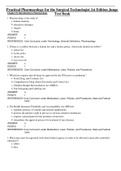Practical Pharmacology for the Surgical Technologist 1st Edition Junge
Chapter 01 Introduction to Pharmacology
Test Bank
1. Pharmacology is the study of
a. human anatomy.
b. alternative therapies.
c. surgery.
d. drugs.
ANSWER: a
POINTS: 1
REFERENCES: Core Curriculum under Terminology, General Definitions, Pharmacology.
2. If there is a conflict between a federal law and a facility policy, which rule should you follow?
a. federal law
b. facility policy
c. stricter rule
d. least strict rule
ANSWER: c
POINTS: 1
REFERENCES: Core Curriculum under Medications; Laws, Policies, and Procedures.
3. Which law requires that all drugs be approved by the FDA prior to marketing?
a. Food, Drug, and Cosmetic Act
b. Comprehensive Drug Abuse Prevention and Control Act
c. Omnibus Budget Reconciliation Act (OBRA)
d. Fair Packaging and Labeling Act
ANSWER: a
POINTS: 1
REFERENCES: Core Curriculum under Medications; Laws, Policies, and Procedures; State and Federal
Laws.
4. The Health Insurance Portability and Accountability Act (HIPAA)
a. regulates potency of vitamin and mineral supplements.
b. protects the patient’s right to privacy in all areas related to healthcare.
c. requires a prescription for the purchase of narcotics.
d. streamlines the approval process for treatment of rare diseases.
ANSWER: a
POINTS: 1
REFERENCES: Core Curriculum under Medications; Laws, Policies, and Procedures; State and Federal
Laws.
5. Physicians must be registered with which federal agency in order to be allowed to prescribe controlled
substances?
a. OSHA
b. FDA
,Practical Pharmacology for the Surgical Technologist 1st Edition Junge
Chapter 01 Introduction to Pharmacology
Test Bank
c. DEA
d. CDC
ANSWER: c
POINTS: 1
REFERENCES: Core Curriculum under Medications; Laws, Policies, and Procedures; State and Federal
Laws.
6. A practice act does NOT
a. define the responsibilities of the practitioner.
b. set minimal staffing limits for a practice.
c. set minimal staffing limits for a practice.
d. describe penalties for noncompliance.
ANSWER: b
POINTS: 1
REFERENCES: Core Curriculum under Medications; Laws, Policies, and Procedures; State and Federal
Laws.
7. Facility policies and procedures must comply with
a. federal law, but not state law.
b. state law, but not federal law.
c. neither federal law nor state law.
d. both federal law and state law.
ANSWER: d
POINTS: 1
REFERENCES: Core Curriculum under Medications; Laws, Policies, and Procedures; Healthcare Facility
Policies and Procedures.
8. A(n) is a written institutional rule or plan of action that addresses a specific need and requires
compliance within that institution.
a. procedure
b. policy
c. law
d. act
ANSWER: b
POINTS: 1
REFERENCES: Core Curriculum under Medications; Laws, Policies, and Procedures; Healthcare Facility
Policies and Procedures.
9. Which publication should you use if you want to look up drug interaction information for Zithromax®?
a. National Formulary (NF)
b. American Hospital Formulary Service (AHFS) Index
c. Physician’s Desk Reference (PDR)
,Practical Pharmacology for the Surgical Technologist 1st Edition Junge
Chapter 01 Introduction to Pharmacology
Test Bank
d. Medical Letter on Drugs and Therapeutics
ANSWER: c
POINTS: 1
REFERENCES: Core Curriculum under Medications, Medication Publications, Physician’s Desk Reference.
10. The provides information about the legal standards for drug quality, strength, and purity established
by the federal government.
a. United States Pharmacopeia (USP)
b. Medical Letter on Drugs and Therapeutics
c. National Patient Safety Goals
d. Physician’s Desk Reference (PDR)
ANSWER: a
POINTS: 1
REFERENCES: Core Curriculum under Medications, Medication Publications, United States Pharmacopeia.
11. Which publication is an official listing of all of the drugs approved by the FDA?
a. Medical Letter on Drugs and Therapeutics
b. National Patient Safety Goals
c. American Hospital Formulary Service (AHFS) Index
d. National Formulary (NF)
ANSWER: d
POINTS: 1
REFERENCES: Core Curriculum under Medications, Medication Publications, The National Formulary.
12. Which publication would be the best resource if you wanted to look up the advantages and disadvantages of different
methods of chemotherapy?
a. National Formulary (NF)
b. Physician’s Desk Reference (PDR)
c. American Hospital Formulary Service (AHFS) Index
d. Medical Letter on Drugs and Therapeutics
ANSWER: c
POINTS: 1
REFERENCES: Core Curriculum under Medications, Medication Publications, American Hospital Formulary
Service Index.
13. In which publication did The Joint Commission (TJC) make recommendations on the use of abbreviations in
the healthcare setting?
a. Physician’s Desk Reference (PDR)
b. National Patient Safety Goals
c. National Formulary (NF)
d. American Hospital Formulary Service (AHFS) Index
ANSWER: b
, Practical Pharmacology for the Surgical Technologist 1st Edition Junge
Chapter 01 Introduction to Pharmacology
Test Bank
POINTS: 1
REFERENCES: Core Curriculum under Medications, Medication Publications, The Joint Commission National
Patient Safety Goals.
14. Which is NOT a potential consequence for a surgical technologist who fails to comply with federal law, state law,
and/or facility policies and procedures?
a. criminal charges
b. civil charges
c. forfeiture of prior earnings
d. job termination
ANSWER: c
POINTS: 1
REFERENCES: Core Curriculum under Medications, Medication/Solution Violations, Personnel Negligence.
15. Which is NOT a potential consequence for the patient if a surgical technologist fails to comply with federal law, state
law, and/or facility policies and procedures?
a. loss of national certification
b. mild discomfort
c. death
d. secondary infection
ANSWER: a
POINTS: 1
REFERENCES: Core Curriculum under Medications, Medication/Solution Violations, Consequences to
Patient.




